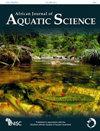A comparison of the water quality and plankton diversity of the Okamini Stream to the freshwater systems within the New Calabar River catchment, Port Harcourt, Nigeria
IF 1
4区 环境科学与生态学
Q3 MARINE & FRESHWATER BIOLOGY
引用次数: 0
Abstract
The water quality and phytoplankton diversity of the Okamini Stream, Port Harcourt, Nigeria was studied between April and June 2018 at three stations. The data was used to assess the health of the system for supporting local communities. Compared to national and international standards, the stream was found to be acidic, but pH levels (5.87 ± 0.40) were similar to other systems in the New Calabar River catchment. Analysis of variance showed that there was no significant variation (p < 0.05) in water quality between the stations, with the exception of PO4 (0.82 ± 0.40 mg l-1), which was significantly higher than other local systems. A total of 26 species of plankton were recorded during the study. These species belonged to the Bacillariophyceae (n = 10), Chlorophyceae (n = 6), Cyanophyceae (n = 5), Euglenoidea (n = 3), and Chrysophyceae (n = 2), but phytoplankton density was low. The most frequently occurring phytoplankton species were indicators of organic pollution, such as Cyclotella comta, while Melosira varians was recorded at all sampling occasions. Relatively high diversity indices indicated a stable environment. We conclude that the Okamini Stream is not yet degraded, but that the water quality should be monitored, and anthropogenic activities managed to avoid potential future deterioration.尼日利亚哈科特港新卡拉巴尔河流域奥卡米尼河水质和浮游生物多样性与淡水系统的比较
2018年4月至6月,在三个站点对尼日利亚哈科特港奥卡米尼溪的水质和浮游植物多样性进行了研究。这些数据用于评估支持当地社区的系统的健康状况。与国家和国际标准相比,该河流呈酸性,但pH值(5.87±0.40)与新卡拉巴尔河流域的其他系统相似。方差分析显示,除PO4(0.82±0.40 mg l-1)显著高于其他地方系统外,各站点之间的水质没有显著变化(p<0.05)。研究期间共记录了26种浮游生物。这些物种属于硅藻科(n=10)、绿藻科(n=6)、蓝藻科(n=5)、眼虫科(n=3)和金藻科(n=2),但浮游植物密度较低。最常见的浮游植物物种是有机污染的指标,如环星藻,而在所有采样场合都记录到了各种各样的Melosira。相对较高的多样性指数表明环境稳定。我们得出的结论是,奥卡米尼河尚未退化,但应监测水质,并管理人为活动,以避免未来潜在的恶化。
本文章由计算机程序翻译,如有差异,请以英文原文为准。
求助全文
约1分钟内获得全文
求助全文
来源期刊

African Journal of Aquatic Science
MARINE & FRESHWATER BIOLOGY-
CiteScore
3.90
自引率
7.10%
发文量
31
审稿时长
>12 weeks
期刊介绍:
The African Journal of Aquatic Science is an international journal devoted to the study of the aquatic sciences, covering all African inland and estuarine waters. The Journal publishes peer-reviewed original scientific papers and short articles in all the aquatic science fields including limnology, hydrobiology, ecology, conservation, biomonitoring, management, water quality, ecotoxicology, biological interactions, physical properties and human impacts on African aquatic systems.
 求助内容:
求助内容: 应助结果提醒方式:
应助结果提醒方式:


